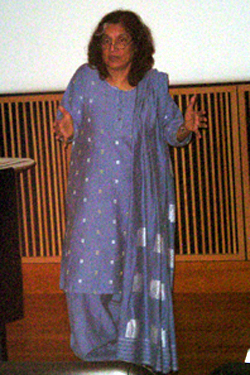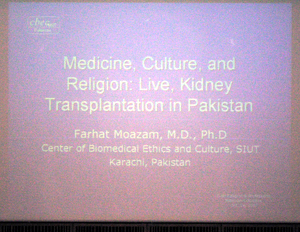 Physician
says understanding religion is a key to
health care Physician
says understanding religion is a key to
health care
Dr. Farhat Moazam, chair and professor at the Centre
of Biomedical Ethics and Culture in Karachi, Pakistan, spoke Oct. 24,
2007, at University of Missouri-Columbia.
Moazam, whose center is affiliated with Sindh Institute
of Urology and Transplantation, spoke about her experiences as a doctor
and ethnologist working with kidney patients in Pakistan.
One difference Moazam noted between the United States
and Pakistan is that in the U.S. medicine is practiced using a very secular
premise and language. This has a tendency to ignore spiritual aspects
of health care and decision-making, she said.
"Birth, death, disease, pain, suffering - the majority
of us learn to work with these issues and make sense of these issues
through reason," she said. "… and our spiritual resources
are extremely important to us (as well)."
Doctors helping to make decisions about patients' health care would be
well served to have an understanding of their shared traditions and religious
beliefs, she said.
Moazam, who was trained in both the U.S. and Pakistan,
said physicians in both countries rely on the same science and technology,
yet have different awareness of religious traditions and cultural beliefs.
Pakistan's population is made up of Muslims, Protestant Christians, Catholics,
Hindus and Zoroastrians. Still, she said, there are "shared values
that cut across social strata and education - a common history and (being)
culturally similar. A big unifying force is the values of Islam," whose
believers make up 95 percent of the country.
 In
Pakistan, there is a "centrality of religion and extended family
in one's life,"
Moazam said. "It is a collectivist culture. Family is the social
unit."
The system is also hierarchal in structure, she said, where "roles
are very clear, based on gender and age." A physician is often treated
as an elder of the family, with the influence and respect accorded to
that position. In
Pakistan, there is a "centrality of religion and extended family
in one's life,"
Moazam said. "It is a collectivist culture. Family is the social
unit."
The system is also hierarchal in structure, she said, where "roles
are very clear, based on gender and age." A physician is often treated
as an elder of the family, with the influence and respect accorded to
that position.
A focus of Islam is obligation to kin, Moazam said,
which often is expressed in making medical decisions, such as organ donations.
In Pakistan, only relatives can donate organs to a patient. "It
is the obligation of the doctor to treat the patient and for the family
member to donate (an organ) to save (a relative's life),"
she said. "Therapeutic distance' (for doctors) doesn't work in Pakistan."
Doctors - recognizing the religious and familial traditions
that inform patients' decisions - can work with those beliefs to make
the best health-care choices for patients (as well as those who may be
marginalized in decision-making by those beliefs), Moazam said.
Doctors in the U.S. and Pakistan can learn from each
other - especially as medical practitioners increasingly have global
experiences and populations around the world become more diverse.
"If we can have intelligible discourse on
that … we have made a good beginning," she said.
 Sponsored
by the MU Center on Religion & the Professions. For more information,
call (573) 882-2770 or e-mail whiteab@missouri.edu. Sponsored
by the MU Center on Religion & the Professions. For more information,
call (573) 882-2770 or e-mail whiteab@missouri.edu.
|

